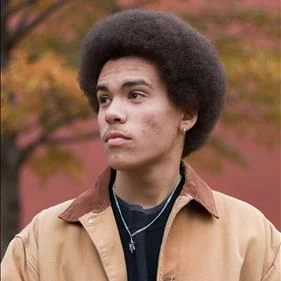In my heart I hold Jerusalem and Africa’

Photos by Donna Armstrong.
Some of Noah Shufutinsky’s earliest memories involve listening to Reggae every Sunday afternoon playing on a local radio station in San Diego, where he spent most of his childhood. Growing up, he remembers, his parents would play West Coast hip hop and rap around the house.
Shufutinsky, a 19-year-old rapper, is majoring in Judaic studies at George Washington University. When not making new music, the sophomore works at Adas Israel Congregation, a Conservative synagogue in Cleveland Park.
Performing under the name “Young Gravy,” Shufutinsky said his stage name comes from a nickname he had as a child. The “million-dollar question” for many of his listeners is where the name comes from.
“At some point, people might know, but there’s a meaning behind it that I’m not going to reveal yet,” Shufutinsky said.
Shufutinsky said George Washington University Hillel has been instrumental throughout his college experience because he often approaches staff and student leaders to discuss their experiences and ask their opinions on ideas for songs. He said he performed at a GW Hillel sponsored holiday party in early December, where he debuted a song, “Diaspora,” which he released Jan. 4.
“It felt really good to do that with the community,” he said. “It’s just been super encouraging as far as having a place to talk about certain music.”
“Diaspora” is a pro-Israel rap, partly sung in Hebrew and English, that explores the Jewish people’s connection to Israel and confronts the issue of anti-Semitism. He recorded a music video for the song during a trip to Israel in December, he said.
Before recording the song and its music video, Shufutinsky frequently rapped parts of the song for students and staff members at GW Hillel to garner feedback about the lyrics, which include powerful lines such as, “In my heart I hold Jerusalem and Africa” and, “I got blue and white in my veins, running through my heart.”
He said he also sent drafts of the song to staff members before performing the song for the first time.
“It’s a song of perseverance,” Shufutinsky said. “It’s a song about how despite being Jewish, despite having all these hardships against us, we’re able to persevere and we should still be proud of who we are and where we come from.”
Shufutinsky said he credits rappers such as Schoolboy Q and E-40 as artists who have influenced his own music. One of his favorite artists is Tupac because of his ability to tell stories that listeners can relate to, as well as Tupac’s ability to put himself into other people’s shoes.
Shufutinsky released a six-song EP titled “Ethnic” in October, which grapples with the intersections in his life, such as what it means to be Black and Jewish in the United States. He said the EP came out of attacks against Black and Jewish communities that he sees on a regular basis and the rise of white supremacy.
“I drew on that to tell my own story and provide a unique take for a lot of the songs on there with production, the types of beats I used and the way I approach different songs,” he said.
The EP, which tells a story as the album progresses, features songs such as “Never Again” and “Stereotypes,” Shufutinsky said. “Never Again” explores a phrase he said he hears often when people discuss issues such as anti-Semitism and police brutality, but do not follow through with action that will prevent the issues from occurring again.
Shufutinsky said “Stereotypes” is one of his most personal songs and his favorite one on the EP. It takes a satirical approach to address stereotypes of being Black and Jewish. In the song, Shufutinsky created a character who controls the weather, controls the banking system and robs people, he said.
The end of the song is like a “breath of fresh air,” ending with, “It’s crazy cause all my stereotypes conflict, if I was all my stereotypes, I wouldn’t even exist.” When all of the stereotypes are put together, they sound so ridiculous that it makes it impossible for the character to exist, Shufutinsky said.
“It was shocking to a lot of people, actually hearing all of this stuff at once and people who know me personally, hearing me say ‘Oh, I would be doing this if I was a stereotype,’” he said. “They can’t even fathom Noah as a criminal, it sounds ridiculous to them. I think it humanizes the person the stereotypes are put on.”
— Elizabeth Mintz